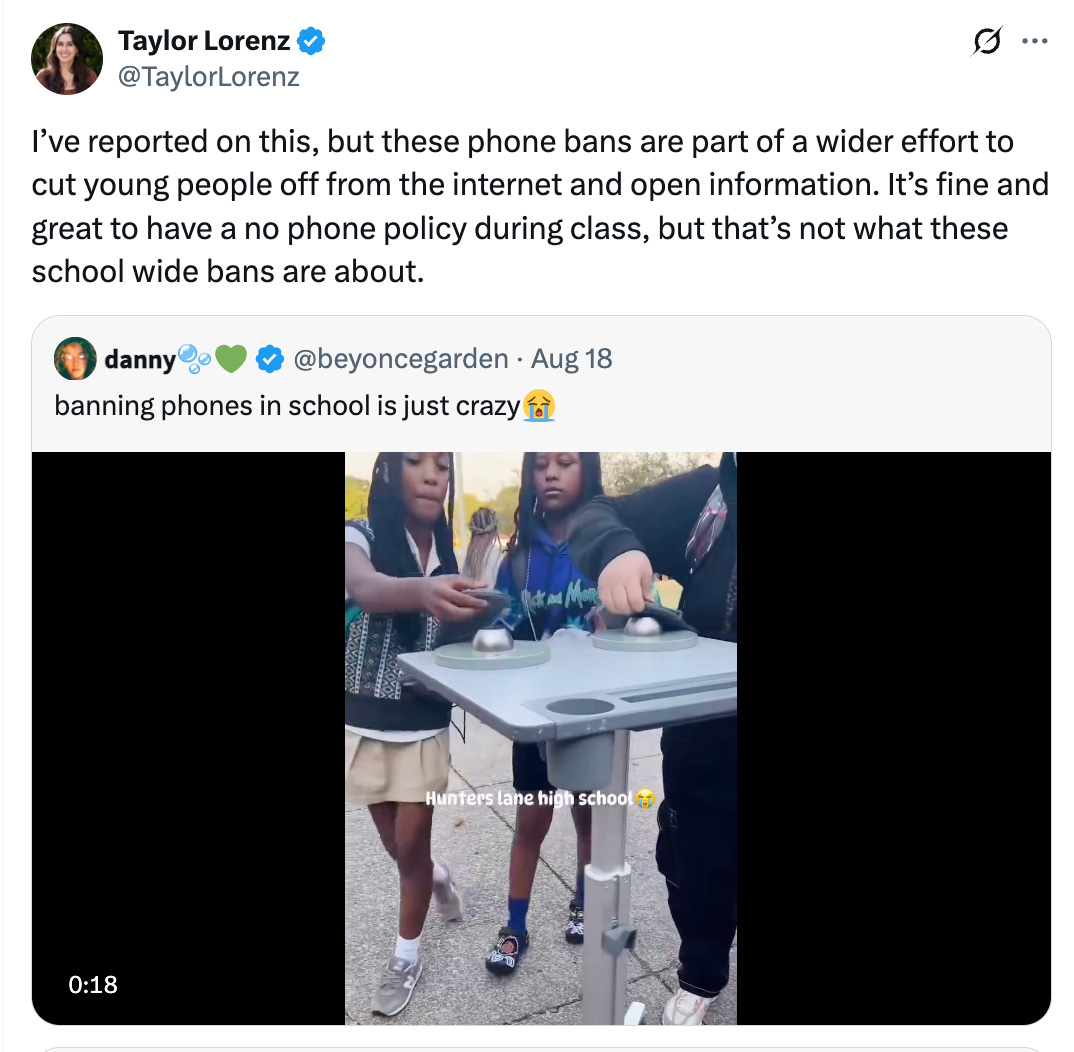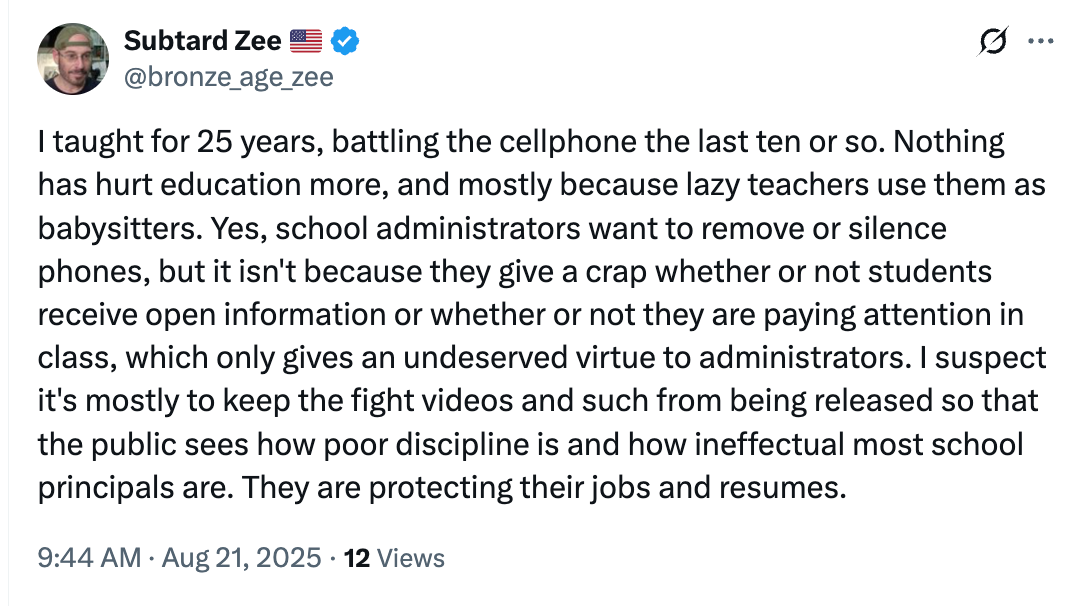Hear Me Out: the Anti-Smartphone Thing Is a Grift
+ romantasy disaster, thought digest, 08.21.2025
You’re reading default.blog, an emotional scrapbook of the Internet, technology, and the future.
REMINDER— TONIGHT’S CALL-IN SHOW THEME IS “SOMEBODY’S WATCHING ME.” WE STREAM AT 8:30 ET/7:30 CT. TUNE IN HERE, ON YOUTUBE, X, AND TWITCH. CALL US AT 702-941-1181.
Taylor Lorenz is butchering what should be a straightforward argument, so let me make it instead.
The classroom phone debate is a red herring.
Nobody actually thinks kids should be scrolling TikTok or worse—Pornhub during class. Nobody thinks poor black and brown kids are using their smartphones as “word processors” in class either. Be so fucking for real.
Phone bans in schools are good policy. Fuck, bring back computer labs and teach technology skills in contained environments. Personally, I didn’t learn jack shit in school because I was toggling between mobile games on my iPhone and MMORPGs. And while we’re banning phones in school? Let’s expand that ban to sidewalks and normalize desktop computers in computer rooms again.
But here’s Taylor’s real point, buried under her terrible messaging: the latest suite of “think of the children” policies create the infrastructure for much broader censorship. The problem isn’t the phone bans themselves—it’s how they’re being used as part of a larger authoritarian project that most people can’t see coming, in large part because of the media conversation.
The media environment around “it’s the phones” has created a false dichotomy: either you support phone bans, age verification, and authoritarian content restrictions, or you’re complicit in hardcore pornography being firehosed straight into toddlers’ eyes.
It’s an obscene grift that weaponizes a real social problem. We demonize the phones, something everyone can get on board with. Then lawmakers introduce age verification requirements supposedly targeting uncontroversially bad content like pornography and extreme violence as “harmful to minors.” But the legal language around “harmful to minors” is deliberately elastic, designed to expand over time. What starts as ID checks for explicit content becomes ID checks for any discussion deemed inappropriate for hypothetical children who might stumble across it. And what’s “harmful” will depend on who’s in office—furries, abortion resources, domestic violence hotlines, LGBTQ content, drug review sites, k-pop, plastic surgery.
It’s anybody’s guess.
The endgame has never been protecting kids—and that’s what Taylor is getting at. It’s creating a permission structure where adults need government approval to access legal information online. Once you’ve normalized showing papers to read certain websites, expanding that requirement is easy. Again, if history is any indication: today it’s porn, tomorrow it’s social media, and the day after, who knows. But what we’re opening ourselves up to is extensive digital tracking and surveillance systems like those used in China, or arrests for social media posts that are deemed threatening, harassing, or inciting violence, as has happened in the U.K.
Lubricating this conversation is a cottage industry of doom merchants who’ve built platforms turning “Zoomers are brainrotted idiots” into careers that appeal to anxious Boomer and Gen X subscribers.
Are these writers politically motivated themselves? I don’t know. I do know that they’re feeding older readers what they want to hear about modern life from someone young enough to have credibility. The “phones are destroying not only my life personally, but civilization” takes create mimetic cascades that escalate, too. Look at Substack: it’s flooded with these essays because they get rewarded with clicks and validation and “you’re so wise” comments.
That’s not to say none of these concerns are valid—many of them are—but scratch the surface and you find the same reductive thinking that plagued every other moral panic.
Everything wrong with society gets blamed on one technology, obscuring other problems. “It’s the phones!”1 is infuriating because it’s simultaneously right and reductive.
Yes, phones are genuinely harmful and they’ve caused real problems. Yes, young people are struggling. But phones are a problem, not the problem.
A short list of things doom merchants blame on smartphones, to put this into perspective:
falling birth rates
people not having personalities (also, what???)
atomization
deterioration of the family
falling literacy rates
why people aren’t having sex
why people are having too much sex
the failures of American public schools
radicalization
anxiety
depression
suicide rates
Do they IMPROVE any of these things? Probably not. Did they CAUSE them?
…
But even more critically: these reductive narratives are manufacturing consent for a very attractive authoritarian trap. You might not see that as your subscriber count ticks up or your bias about young people is validated.
ROMANTASY FYRE FEST (OR DASH CON?)
A second romantasy convention disaster has hit the building. Apparently this is an epidemic. From a friend on the ground:
I looked into it and it’s real:
Quick question: WTF is going on with these failed book cons? Is it just that people don’t realize how difficult event planning is, or what? How are so many happening? I think this might be worthy of a full DF deep dive.
LINKS + THINGS
The Narcissist, the Psychopath, the Lolcow by Gio's Content Corner.
Digital reality as a Ponzi scheme: you benefit from replies of others by Andrey Mir
The return of college Facebook groups, brought to you by TikTok in TechCrunch
ICYMI
The AI Companion Who Cares
You’re reading default.blog. An emotional scrapbook of the Internet, technology, and the future. This is a guest post by Steven Dashiell.
Submit missed connections, personals, and advice questions to Katherine directly or on Tellonym. She’s always accepting writing submissions, personal ads ($20 per ad), and regular ads ($50 per ad).
No hate to Playboy editor Magdalene Taylor who popularized this extremely useful phrase. While I disagree with her on the specifics, I do not think she is one of these “doom merchants.” It’s a slippery topic precisely because it’s so mixed up with legitimate complaints.








You can't underestimate the intentionality here. It's useless to say "everything in moderation" because the phones have been explicitly engineered, at immense expense, to capture constant attention and destroy moderation. "Phones" are not some neutral or passive entity; they are the tool of a particularly rapacious branch of capital.
I'm one of those millennials (born in '88) who grew up with unfettered access to what I would call an "open" internet. My main avenue for accessing content was via peer to peer sharing networks. All of those networks are still there and I still use them. From my discussions with folks, boomers, gen-x and younger millennials don't seem to know too much about that space. Those spaces will be incredibly difficult to shut down (just look at Pirate Bay - it's still going strong). Even if gov't could shut it down, things would just revert to what they were like when I was in high school - content was moved around on USB sticks.
My hunch is that any age verification requirements applied to the large tech companies will be a good thing. Many (I'm not saying most) will forgo access to services that require age verification because the price (handing over your ID) will be too great. If I'm right, there will be a large "regulated" part of the internet (big tech) and an unregulated/open part of the internet that will grow over time (particularly if government/big tech cooperate and abuse their power, which is almost certain).
As for the phones, once you start poking around the neuroscience, it becomes obvious that these things are potentially the most powerful drug ever invented. The Las Vegas mob worked out that closing the blinds and putting on fluorescent lights would keep people at the tables - we're very susceptible to addiction when our neural pathways get hijacked. The TLDR on that front goes something like this: the retinal nerve in our eyes connect directly to what is called the " suprachiasmatic nucleus" (SCN) via the retinohypothalamic tract, which is buried deep in the hypothalamus (which regulates the autonomic nervous system - heart beat etc). The SCN is the master circadian regulator in the body. Disruption of that system via artificial light (e.g. phones, particularly at night time) is like putting the conductor of an orchestra on ketamine. The orchestra (i.e. your body) can't function properly. Although I agree that the phone debate is turning into a moral panic, I think the sense of worry is based on something very fundamental that very few people (even a lot of doctors) are aware of.
For anyone who is interested in the phone debate, I strongly suggest you have a look at how disruption of the SCN affects the functioning of the brain and body.